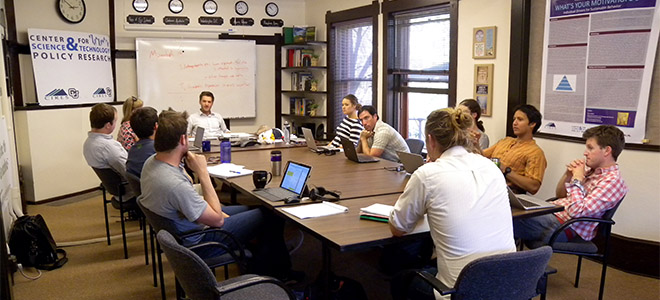How Do Science and Technology Affect Policymaking? How Does Policymaking Affect Science and Technology?by Abigail Ahlert, CSTPR Writing Intern |
 |
For the past 12 years, the Graduate Certificate in Science and Technology Policy program has been helping people explore these questions and more. The goal of the program is to prepare graduate students for careers at the interface of science, technology, and decision making. Certificate program students strive to understand the broad societal context of science and technology, as well as gain insight to the methodologies of policy analysis. The program has graduated 27 students and has 27 currently enrolled. Courses that satisfy the program’s 18-credit requirement span environmental science, economics, law and philosophy. Recently, an informal survey of current and former students was conducted to gauge satisfaction with the certificate program. The survey spans the perspectives of students who have participated in the program as early as 2004 and as recently as this year. One wrote, “While I have only completed one core and one elective course so far, I already feel that the program has broadened my exposure to possible roles for people with scientific and technical backgrounds to influence policy. I have also learned much about the ways in which data is gathered to assess public opinion of scientific research and science policy.” Another student said, “The certificate program introduced me to new perspectives about the role of science that did not come with my research training. I left the program with the ability to think broadly about the implications of research on the policy process, as well as the impact of policy on the scientific community. Importantly, when I applied for fellowship programs and awards, the certificate was documented proof of my interest and commitment to science policy.” The survey results indicate that the Graduate Certificate has been crucial for many students’ professional development and very helpful for job entry. One student said that the course “Science, Technology and Society” (STS) was “one of the most important classes I have ever taken”. I sat down with Dr. Alexander Lee, a lecturer for CSTPR and CU’s Environmental Studies program, who this semester is teaching STS—one of the required courses for the Graduate Certificate. Dr. Lee’s curriculum for the course centers around seminal science and technology policy texts (such as Thomas Kuhn’s The Structure of Scientific Revolutions) and, admittedly, topics that he finds interesting. Though he specializes in environmental ethics, he likes to keep the course broad. “It wouldn’t be unusual for a class like this [in an ENVS program] to focus on just issues like climate change or ecological degradation, whereas I think it’s very important to understand those issues in the broader context of science and society,” says Dr. Lee. He says that the idea of providing scientists with policy and communication skills is not new, but the formalization of it into a certificate program is relatively uncommon. “Often scientists—and when I worked as a glaciologist I found this—are required to use technical language and put technical constraints on how you present things, and that’s not always the most effective way science can be communicated and works in the world as a tool,” says Dr. Lee. He thinks that scientists should be able to effectively write and talk about science in a general way. So why is it important to engage scientists in policymaking? Dr. Lee noted that scientists are often acknowledged as “experts” in their field and believes that it’s important for scientists to understand this responsibility and what it means in a social context. In terms of the future of science policy, he says, “We’re hitting a lot of really novel issues in science policy…we are facing what I think are truly new types of problems as a global community, whether it be climate change or the technological revolution that we’re currently in. It seems like these are global in scale, exponential in growth, and not well analogous to problems in the past.” All in all, programs like CSTPR’s Graduate Certificate help to bridge disciplines and effectively utilize new information and diverse skill sets. For more information on the Graduate Certificate in Science and Technology, please visit the STP website and contact Ami Nacu-Schmidt at ami.nacu-schmidt@colorado.edu. |

